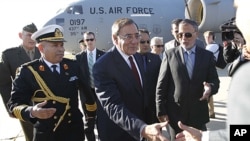U.S. Defense Secretary Leon Panetta has made a historic visit to a newly liberated Libya, where he has offered U.S. support as the country's transitional leaders struggle to create a cohesive democratic society.
It was the first visit to Libya by a U.S. defense secretary, and was symbolic of a new era in relations between Washington and a nation that was once one of its main enemies.
Panetta's motorcade sped past buildings riddled with bullet holes and the bombed-out complex that was once the headquarters of longtime leader Moammar Gadhafi, scars of an eight-month civil war.
Along the way, a spontaneous welcome from Tripoli residents. People flashed victory signs and graffiti on walls had messages of thanks for the United States and its allies.
Panetta went straight into meetings with Libya's transitional leaders, including the interim prime minister, and told them Washington wants to help them build a new, democratic society.
“I believe that this new and free Libya can become an important security partner for the United States," he said. "Libya is now in the hands of the Libyan people. They will chart their future. They will determine what assistance they require from the United States and the international community."
The United States and NATO assisted revolutionary forces with air support and intelligence during the eight month civil war that toppled leader Moammar Gadhafi. Now Washington is offering a different kind of assistance - on the ground.
The United States on Friday announced the lifting of most of the sanctions it imposed during the Gadhafi rule, a move Panetta said is aimed at helping the new government get started.
“This measure will allow the Libyan government to access most of its worldwide holdings, and assist the prime minister in his efforts to oversee the country's reconstruction and transition."
Under the U.S. action, assets under U.S. jurisdiction that are owned by the Gadhafi family or members of the late leader's inner circle remain frozen.
Panetta told Libyan leaders the United States stands ready to offer security assistance to them. He said there was no discussion of weapons sales.
In a sign of the challenges the new government is facing, demonstrators protested outside the prime minister's office as he met with Panetta. They said they have not been payed their wages for months.
The defense chief's visit comes as outbreaks of violence trigger doubts on whether Libya is ready to transition to a stable democracy. A recent gunbattle near the Tripoli airport between revolutionary forces and militias highlighted the difficulties that Libya's interim leaders are having in forming key institutions like the army.
Still, Panetta expressed optimism that the courage and heroism of those who fought Gadhafi would drive Libya into a better future.
Later, he went to a cemetery on Tripoli's waterfront and laid a wreath at the burial place of 13 U.S. sailors killed during the time of Barbary wars, at the start of the 19th century.
The visit to Libya culminated a tour of the region that included Djibouti, Afghanistan, Iraq and Turkey. In Iraq, Panetta attended an event marking the formal end of the U.S. war in that country and paid tribute to the more than 4,000 American troops and tens of thousands of Iraqis killed in the conflict.




